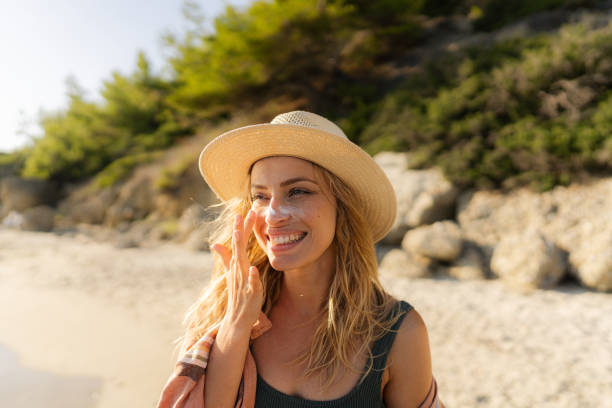
Sunscreen is one of the most important products in skincare. It protects the skin from harmful ultraviolet (UV) rays that come from the sun. These rays can cause sunburn, dark spots, wrinkles, and even skin cancer. Applying best sunscreen daily helps maintain healthy and youthful skin. It should be used by men, women, and children, regardless of age or skin type.
Why Sunscreen Is Important
The sun releases two types of rays – UVA and UVB. UVA rays age the skin, while UVB rays cause sunburn. Both types can damage the skin deeply and lead to long-term problems. Sunscreen forms a protective layer on the skin to block these rays. Even when it is cloudy outside or during winter, UV rays still reach the earth. That’s why sunscreen is not only for sunny days. It should be part of your daily routine.
Types of Sunscreen
Sunscreens are mainly divided into two types: physical and chemical.
-
Physical sunscreen sits on the surface of the skin and reflects the sun’s rays. It usually contains ingredients like zinc oxide and titanium dioxide.
-
Chemical sunscreen absorbs the UV rays before they can damage the skin. It often contains ingredients like avobenzone, oxybenzone, or octinoxate.
Both types are effective, and the choice depends on your skin type and personal preference.
How to Choose the Best Sunscreen
Choosing the right sunscreen depends on various factors. Here are some things to consider:
-
SPF (Sun Protection Factor): SPF shows how much protection a sunscreen gives from UVB rays. SPF 30 blocks about 97% of UVB rays. SPF 50 blocks around 98%. For everyday use, SPF 30 is enough, but if you stay outdoors for long periods, SPF 50 is better.
-
Broad-Spectrum Protection: Always look for sunscreen that offers broad-spectrum protection. This means it guards against both UVA and UVB rays.
-
Water Resistance: If you sweat a lot or swim, choose a water-resistant sunscreen. It will stay longer on the skin and give better protection.
-
Skin Type: People with oily skin should choose oil-free or gel-based sunscreens. Those with dry skin can use cream-based or moisturizing sunscreens. Sensitive skin types should go for fragrance-free and hypoallergenic formulas.
Best Sunscreen for Oily Skin
If your skin gets oily quickly, a lightweight and non-greasy sunscreen is ideal. Gel-based sunscreens absorb fast and leave no sticky feeling. Look for labels that say "oil-free" or "matte finish." This helps keep the skin fresh without clogging pores.
Best Sunscreen for Dry Skin
Dry skin needs extra moisture. Cream-based sunscreens or those with hydrating ingredients like hyaluronic acid or glycerin are good options. These sunscreens protect the skin while keeping it soft and smooth.
Best Sunscreen for Sensitive Skin
Sensitive skin can easily react to fragrances and harsh chemicals. Choose mineral sunscreens that have zinc oxide or titanium dioxide. These ingredients are gentle and safe for all skin types, including babies and people with allergies.
How to Apply Sunscreen
Applying sunscreen correctly is just as important as choosing the right one. Here’s how to use it effectively:
-
Use sunscreen every day, even when staying indoors or during cloudy weather.
-
Apply it at least 15 to 20 minutes before going outside.
-
Use enough sunscreen to cover all exposed areas – face, neck, arms, and hands.
-
Reapply every two hours if you are outdoors, swimming, or sweating.
Common Myths About Sunscreen
Many people believe sunscreen is only for summer or that dark skin does not need it. These are common myths. Sunscreen is necessary in all seasons. UV rays are always present and affect the skin year-round. Also, people with darker skin can still get sunburn and skin damage. Everyone, regardless of skin tone, should use sunscreen daily.
Benefits of Daily Sunscreen Use
Using sunscreen daily has several benefits for the skin:
-
Prevents sunburn and irritation
-
Reduces the risk of skin cancer
-
Slows down signs of aging like wrinkles and fine lines
-
Fades dark spots and uneven skin tone
-
Keeps skin smooth and healthy
Sunscreen for Children
Children have delicate skin and need extra protection. Use a sunscreen specially made for kids, preferably with mineral ingredients. Make sure it is gentle, tear-free, and safe for sensitive skin. Always apply sunscreen to children over six months old before outdoor activities.
Sunscreen in Makeup Products
Some makeup products like foundations or BB creams contain SPF. While these offer light protection, they are not enough alone. It is better to use a proper sunscreen before applying makeup. This gives full protection and keeps the skin safe.
Sunscreen and Indoor Use
Even when staying indoors, UV rays can enter through windows. If you sit near windows or use screens like laptops and phones for hours, sunscreen helps protect against blue light and UV exposure.
Sunscreen for Men
Many men skip sunscreen, thinking it is only for women. But men's skin also needs protection. There are many lightweight and non-greasy options that are perfect for daily use. Men who work outside or play sports should make sunscreen a habit.
How to Store Sunscreen
Sunscreen should be stored in a cool, dry place. Avoid keeping it in direct sunlight or in hot cars. Always check the expiry date. Expired sunscreen loses its effectiveness and should not be used.
Conclusion
Sunscreen is a simple but powerful product that should be part of everyone’s skincare routine. It protects against sun damage, keeps the skin healthy, and prevents many skin problems. No matter your age, gender, or skin type, using the best sunscreen daily is a smart and safe choice. Pick the one that suits your skin, apply it properly, and enjoy long-lasting skin protection every day.
Comments on “Best Sunscreen for All Skin Types and Daily Use in Every Season”